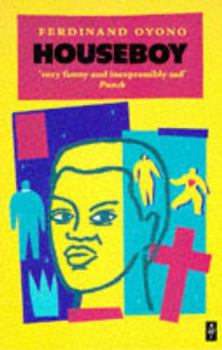Houseboy
Select Format
Select Condition 
Book Overview
The contributors to this volume offer an original approach to debates about indigenous knowledge. Concentrating on the political economy of knowledge construction and dissemination, they look at the variety of ways in which development policies are received and constructed to explain how local knowledges are appropriated and recast, either by local elites or by development agencies. Until now, debates about indigenous knowledge have largely been conducted...
Format:Paperback
Language:English
ISBN:0435905325
ISBN13:9780435905323
Release Date:January 1966
Publisher:Heinemann Educational Books
Length:128 Pages
Weight:0.40 lbs.
Dimensions:0.3" x 5.0" x 7.6"
Customer Reviews
5 ratings
houseboy review
Published by Thriftbooks.com User , 16 years ago
"Houseboy" is a stimulating story of life in Arica. It carries you to heights and depths of emotion as the story unveils. It is brief but thorough and easy reading. I could not put the book down!
A Boy's Struggles During Africa's Colonialism!!!
Published by Thriftbooks.com User , 18 years ago
This is a very interesting book. It was used for a class I took in African-American Literature. The book gives an account of a boy, named Toundi, whose dad would beat and curse him. The story is based in Africa. Toundi eventually left his parents home to stay at the European mission. He worked with a priest named, Father Gilbert. Toundi learned how to read and write English. His name was eventually changed to Joseph. His life was filled with changing situations and instability. Upon the death of Father Gilbert he eventually became a houseboy to the Commandant for the area. Certain individuals distrusted him because of a female in the story. The root cause of Toundi's problem was based on a male-female relationship including rumors of emotional affairs. The book shows that beauty on the outside can be misleading. The story has a twist of deceit, adultery, accusations, and power struggle. The setting and storyline is based in Cameroon during a period of colonialism that affected the culture of the people and the society. Toundi had written his story in a diary. It was found during his quest to escape to the Spanish zone from the mission. Unfortunately he died in his quest for freedom from bondage. He should have listened to his mother!
Lovely and accurate story
Published by Thriftbooks.com User , 21 years ago
This story of a boy-servant in Cameroon is fitting example of the cultural contrast between the colonizing French and the indigenous people of Western Africa. This story reminds us that truth and civilization are merely matters of perception. Anyone studying francophone literature should stop to read this short piece.
African Perspective of Colonialism
Published by Thriftbooks.com User , 22 years ago
Houseboy, was written from an African perspective of colonialism by Cameroonian-born Ferdinand Léopold Oyono and is an examination of the complex relationships between Africa's colonialists and catalysts for economic and social change. Considered risqué when first published in 1956, Houseboy added to the growing body of African political literature beginning with the Negritude Movement launched by the Francophone writers in the late 1930's which advanced the idea that literature could serve as an important ideological instrument for African emancipation.Seemingly innocuous on the surface, the story is derived from the diary and observations of a rural African boy named Toundi Ondoua during the pre-independence period from the colonial and missionary occupation of Cameroon. The tale of a young man growing up during this historical timeframe is meant to be systemic of Africans in general, as they too struggle with the impact of colonialism on their identity, society and culture.In conclusion, Toundi's story is ironic and tragic as he gives up his traditional identity and is inevitably drawn into the web of servitude, standing transfixed as his fate and ultimate demise approaches. Toundi's fragile self-esteem and idealistic preconceptions about the Europeans begin to flake and peel like paint from an ancient fula fula (taxi).. Toundi realizes in the end that he belongs not to the world of his village nor to the one of the whites, but is caught in the groundswell of those Africans whose fate became inextricably tied to that of the colonialists and the changing world. Toundi inquires on his deathbed...."Brother, what are we? What are we blackmen who are called French?"
Colonialism from a first-person p.o.v.
Published by Thriftbooks.com User , 25 years ago
In the realm of African fiction, this novel stretches against the myriad of cultural divisions erected through colonialism. Much has been said about African fiction as a form, and of the use of the novel by writers whose cultural roots are based in an oral, dynamic storytelling as opposed to the Western one of static writing. This novel plays on one of those subsets, the first-person diary, and both enforces the reader's identification with the African protagonist while pushing the reader away through choices and actions which may seem alien to a Western audience. Indispensible for anyone with an interest in African writing and/or colonialism and its effects. As with all of my readings in African fiction, I am more struck by the silence the text evokes than the speeches constructed therein. Silence is everywhere in this novel, as well as in the works of writers such as Achebe or Soyinka. I would argue that, in that respect, African writers have co-opted the written forms of the colonial cultures for their own ends; what other group of writers has so consistently and effectively caused the text of the book to evoke the absence of words?






